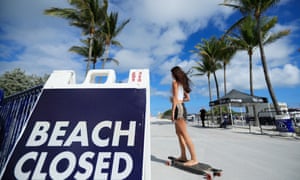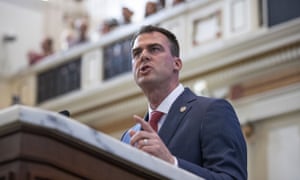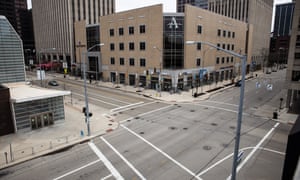Disunited states of America: responses to coronavirus shaped by hyper-partisan politics
Democratic states have tended to be more proactive while some Republican governors followed Trump in downplaying the crisis

Photograph: Cliff Hawkins/Getty Images
It was a tale of two beaches. On Florida’s Atlantic coast, at the height of spring break season, the sand was deserted in the cities of Miami Beach and Fort Lauderdale, where Democratic mayors had imposed closures to fight the spread of coronavirus.
Across the narrow neck of the state, the Gulf coast beaches in Clearwater were a world apart. There the Republican mayor had declined to impose a closure, and photos that would circle the world captured the result: thousands of carefree sunbathers lining the sand and mingling in the water.
The public health risk from such large gatherings was not a secret. A day earlier the Centers for Disease Control (CDC) had advised against gatherings of more than 50 people, and New York’s governor, Andrew Cuomo, a Democrat, warned the coronavirus “has already spread much more than you know”.
But at the time Florida’s governor, Ron DeSantis, like most of his 25 Republican peers across the country, did not see cause for alarm, and he has still not closed non-essential businesses statewide, despite warnings by medical professionals that coronavirus cases there could “explode”.
Hundreds of US counties and all 50 states now have confirmed coronavirus cases – despite a widespread lack of testing – underscoring the indifference of the virus to the familiar political boundaries separating red states, dominated by Republicans, and blue ones, dominated by Democrats.
But while the virus does not select for party affiliation, contrasting emergency responses at the state and local levels have split dramatically along partisan lines.
States with Democratic governors have been quicker to declare emergencies, close schools, shutter non-essential businesses and impose limits on bars and restaurants, according to data collected by the Kaiser Foundation. Fifteen of 21 states to have issued stay-at-home orders have Democratic governors.
States with Republican governors, meanwhile, have been less eager to ask businesses to close, and more likely to downplay the threat. “Go to the grocery stores. For crying out loud, go to the grocery stores,” Governor Jim Justice of West Virginia told residents on 16 March. “If you want to go to Bob Evans and eat, go to Bob Evans and eat.”

The night before, Oklahoma’s Governor Kevin Stitt tweeted a picture of himself and his two sons at a restaurant, boasting: “It’s packed tonight.” The tweet was later deleted.
The divergence in state responses to coronavirus does not cleanly split along the red-blue line, with Republican governors in states such as Ohio and Maryland among the most proactive in responding to the threat, said University of Southern California professor Manuel Pastor.
“It’s more like the rational states versus the Trump Republican states,” Pastor said.
All partisan disagreements in the United States in 2020 seem to emanate from or end with Donald Trump. But the president has encouraged a partisan divide on the coronavirus threat, analysts said, pitting state governors against each other and setting off bidding wars for medical equipment.
While states and localities have primary responsibilities for public health under the American system of federalism, the president has an important role in focusing the national attention on the emergency and channeling the massive resources of the federal government to the states most in need, said Lawrence O Gostin, a professor of public health at the Johns Hopkins University.
“This is something that’s really unprecedented and clearly American federalism is not well equipped to do it. You need every oar to work together. We have fragmentation, name-calling and wildly different responses,” Gostin said.
Because past disasters were locally confined, states were able to help each other, by sending firefighters to combat wildfires in California, by sending first responders to help in New York after September 11, or by accepting refugees from Hurricane Katrina.
“This is almost like we have a hurricane,” Maryland’s governor, Larry Hogan, a Republican who has moved aggressively on coronavirus, said on the radio show of the former New Jersey governor on Thursday. “But it’s hitting every single state in the country at the same time, and it’s been hitting them for 21 days, at least in our state.”
Citizens judge the viral threat according to their politics, polling indicates. More Democrats than Republicans have told pollsters they were “extremely concerned” about coronavirus by a 20-point margin. A poll released on Friday showed that viewers of conservative Fox News, which spent weeks downplaying and dismissing the virus, were much less likely to take the pandemic seriously.
“The idea that states can decide particular local issues on a wide range of things allows for such variation,” said Pastor. “That’s, of course, kind of stupid, in the context of the pandemic, because when one state has lax standards, then you wind up maintaining the infection in another location.”
The partisan divide over the pandemic probably stems in part from personal experience, with the worst-hit states so far, including New York, California and Washington, being coastal with large cities and a lot of Democrats. As of Thursday, counties that voted for Trump in 2016 accounted for 45% of the US population but just 19% of all US coronavirus deaths, according to analysis by Dave Wasserman of the Cook Political Report.

That picture is likely to change in the coming weeks, however. Governors in some non-coastal states have taken aggressive action against the virus, including Kentucky’s Andrew Beshear, a Democrat, and Ohio’s Mike DeWine, a Republican.
While Kentucky was quick to set up lab testing for the virus and declared a state of emergency on 6 March, the governor nextdoor, Republican Bill Lee of Tennessee, waited a week longer to declare a state of emergency.
In Ohio, DeWine became one of the first governors in the country to order bars and restaurants to close and limit large gatherings, while the Democratic governor of neighboring Michigan was slower to issue restrictions. As of last week, Ohio had recorded 351 cases, compared with 1,035 for Michigan – although variations in testing obscure the picture.
“I think it’s impossible to talk about a Covid epidemic in the United States,” said Gostin. “We’d have to say it’s Covid epidemics. Because the epidemics will vary state by state, and the response will vary state by state.”
It is “crucially urgent” for the Trump administration to coordinate aid for the states and for the president to use his bully pulpit to focus the national attention, said Gostin.
“That should have been happening several weeks ago,” he said. “The longer we wait without having a properly coordinated national approach the worse the disaster will unfold in the United States.”



